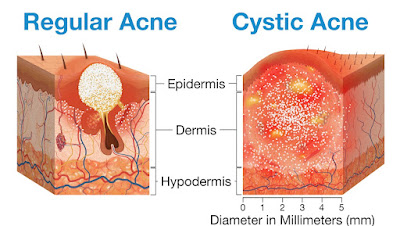Acne is a common skin condition that occurs when hair follicles become clogged with oil and dead skin cells. This can lead to the formation of pimples, blackheads, whiteheads, and other types of blemishes on the face, neck, chest, back, and shoulders. Acne can be caused by a variety of factors, including hormones, genetics, bacteria, and lifestyle factors such as diet and stress. While acne is not a serious health condition, it can be frustrating and embarrassing, and can sometimes lead to scarring if not treated properly. Acne can occur at any age, but it is most commonly associated with the teenage years. The hormonal changes that occur during puberty can cause the skin to produce more oil, leading to the development of acne. However, acne can also occur in adults, particularly in women during pregnancy, menstruation, or menopause when hormone levels are fluctuating. Some adults may also develop acne as a result of stress, certain medications, or other underlying medical conditions. While acne can be frustrating at any age, there are effective treatments available to help manage the condition.
Causes of acne:
Acne can be caused by a variety of factors, including:
Hormonal changes: Hormonal changes during puberty, pregnancy, and menstruation can cause the skin to produce more oil, leading to the development of acne.
Genetics: Acne can run in families, suggesting that there may be a genetic component to the condition.
Bacteria: The bacteria Propionibacterium acnes can contribute to the development of acne by causing inflammation in the hair follicles.
Diet: Some studies have suggested that a diet high in processed and sugary foods may increase the risk of developing acne.
Stress: Stress can trigger the release of hormones that can lead to the development of acne.
Cosmetics and skincare products: Certain cosmetics and skincare products can clog pores and contribute to the development of acne.
It's important to note that the causes of acne can vary from person to person, and that effective treatment may require a personalized approach.
Types of acne:
There are several different types of acne, including:
Whiteheads: Small, closed bumps that appear on the skin's surface and are caused by clogged hair follicles.
Blackheads: Similar to whiteheads, but open and black in color due to exposure to air.
Papules: Small, red, raised bumps that can be tender to the touch.
Pustules: Similar to papules, but filled with pus.
Nodules: Large, painful bumps that form deep under the skin.
Cysts: Deep, painful, pus-filled bumps that can cause scarring.
Hormonal acne: Acne that is caused by hormonal changes, such as those that occur during puberty, menstruation, pregnancy, or menopause
The treatment approach for acne may vary depending on the type and severity of the acne. It's important to consult with a dermatologist to determine the most effective treatment plan for your individual needs.
Treatment of acne:
The treatment of acne depends on the severity and type of acne, as well as individual factors such as age, skin type, and medical history. Some common treatments include:
Topical treatments: These are creams, gels, or lotions that are applied directly to the skin. Topical treatments may contain ingredients such as benzoyl peroxide, salicylic acid, or retinoids, which can help to unclog pores, reduce inflammation, and prevent new acne from forming.
Oral medications: Oral medications such as antibiotics, hormonal therapies, and isotretinoin may be prescribed for more severe cases of acne.
Professional procedures: Dermatologists may perform procedures such as chemical peels, microdermabrasion, or light therapy to help reduce acne.
Lifestyle changes: Making changes to your diet, getting regular exercise, and managing stress can all help to improve acne.
It's important to note that acne treatment can take time, and that some trial and error may be required to find the most effective treatment approach. Consulting with a dermatologist can help you to develop a personalized treatment plan for your acne.























0 Comments